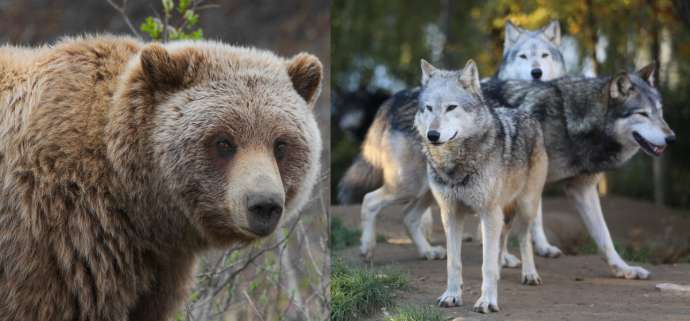STA, 13 November 2020 - Farmers reported fewer attacks on livestock by wolves and bears this year compared with 2019, with wolves causing more damage than bears. The agriculture chamber says this is a result of wolves not being regularly culled for several years now, whereas emergency hunting is not effective enough.
Bears meanwhile seem to be happy with this year's abundant food in forests, which has partly reduced conflicts with humans and their property, the Chamber of Agriculture and Forestry (KGZS) has told the STA.
Nevertheless, the management of large wild animals remains very difficult, since it takes rather long to get a decision on emergency wolf and bear cull if the safety of people is not at stake, the chamber explains.
It continues to urge regular, quota-based hunting as a means of big wild animals management, adding that farmers and rural areas will pay the highest price as the country is struggling to set up a system acceptable to all.
As many as 87 fewer damage cases involving bears and 40 fewer involving wolves were reported in the January-September period compared with the same nine months in 2019.
A total of 228 cases of bear-caused damage valued at EUR 75,000 were reported this year as opposed to 315 and EUR 108,00, respectively, in the same period in 2019.
Data from the Slovenia Forest Service for wolves shows a drop from 299 to 259 cases, with the damage reported down from EUR 207,000 to EUR 126,000.
The wolves and bears most frequently attacked livestock in the heavily forested area around Kočevje in the south, and in Primorska, west, and Notranjska, south-west.
The Environment Agency, which processes the damage claims, received 447 such claims by the end of October, of which 237 were related to wolves and 210 to brown bears.
As many as 157 claims were endorsed and EUR 87,000 in damages paid out, while slightly more than 260 claims amounting to almost EUR 90,000 are still being processed.
With both wolf and brown bear being protected endangered species, several attempts to regulate their growing populations have failed due to opposition by environmentalists.
Nevertheless, wolves and bears continue to be "removed from nature", including on the basis of decisions issued by the Environment Agency.
Twelve wolves were removed this year, up five from the same period last year. This compares to a total of 20 wolves culled last year.
The figures for bears for the nine months is 99, compared with 153 in the same period last year and a total of 183 bears culled in entire 2019.
This year the government plans to start changing the 2009 strategy on the preservation and sustainable management of wolves as part of the Life WolfAlps EU project.
A strategy on bear management was meanwhile subject to public consultation this year and is expected to be adopted next year, the Environment Ministry has told the STA.
Jackal is another wild animal causing damage to farmers, mostly in SW, with 88 damage cases being reported for the nine months, up 11 from the same period in 2019.
While 197 jackals are planned to be removed from nature this year, 145 have been removed between 1 July, when the hunting season opened, and 10 November.






